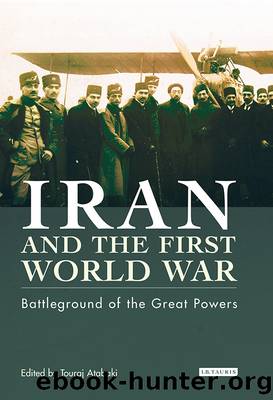Iran and the First World War by Touraj Atabaki

Author:Touraj Atabaki [Atabaki, Touraj]
Language: eng
Format: epub
Tags: History, Middle East, General
ISBN: 9781786734679
Google: oNuRDwAAQBAJ
Publisher: Bloomsbury Publishing
Published: 2006-06-28T22:28:23+00:00
7
Pan-Turkism and Iranian Nationalism1
Touraj Atabaki
Twentieth-century historiography on nationâstate correlation and nationalism has to a large extent been shaped by a Eurocentric ethno-linguistic discourse, where âethnicity and languageâ become the central, increasingly the decisive or even the only criteria of potential nationhood,2 or as Karl Renner asserts:
once a certain degree of European development has been reached, the linguistic and cultural communities of people, having silently matured throughout the centuries, emerge from the world of passive existence as people (Passiver Volkheit ). They become conscious of themselves as a force with historical destiny. They demand control over the state, as the highest available instrument of power, and strive for their political self-determination. The birthday of the political idea of the nation and the birth-year of this new consciousness, is 1789, the year of the French Revolution.3
However, what this perception of the nation-state largely neglects is the fact that the construction of a bounded territorial entity (or what is generally referred to as nation-state building) has often entailed components other than ethnic or linguistic bonds. Collective imagination, political allegiances, reconstructing and reinterpreting history, and the invention of necessary historical traditions to justify and give coherence to the emerging modern state, all these are often major factors in bringing groups of people together and strengthening or even forming their common sense of identity and political solidarity. In some cases the mere application of ancient, historically resonant names and traditions is enough to evoke a consensus of political legitimacy. Consequently the social connotations of certain key socio-political phrases, as well as geographic terms, become an important element in reshaping the geographic boundaries of emerging sovereign states.
As far as Iran is concerned, it is widely argued that Iranian nationalism was born as a state ideology in the Reza Shah era, based on philological nationalism and as a result of his innovative success in creating a modern nation-state in Iran. However, what is often neglected is that Iranian nationalism has its roots in the political upheavals of the nineteenth century and the years immediately following the Constitutional Revolution of 1905â9. It was during this period that Iranism gradually took shape as a defensive discourse for constructing a bounded territorial entity â the âpure Iranâ standing against all others. Consequently, over time there emerged among the countryâs intelligentsia a political xenophobia that contributed to the formation of Iranian defensive nationalism. It is noteworthy that, contrary to what one might expect, many of the leading agents of the construction of an Iranian bounded territorial entity came from non-Persian-speaking ethnic minorities, and the foremost were the Azerbaijanis, rather than the nationâs titular ethnic group, the Persians.
The aim of this study is to throw further light on the complex origins of Iranian nationalism. While examining the various loyalties of the Iranian non-Persian intelligentsia, I shall sketch the measures adopted by such groups when defending their real or imagined identities against the early twentieth-century irredentist ideology of neighbouring states.
The outbreak of the First World War
For many Iranians the 13 months of âlesser
Download
This site does not store any files on its server. We only index and link to content provided by other sites. Please contact the content providers to delete copyright contents if any and email us, we'll remove relevant links or contents immediately.
The Vikings: Conquering England, France, and Ireland by Wernick Robert(77302)
Ali Pasha, Lion of Ioannina by Eugenia Russell & Eugenia Russell(39319)
The Vikings: Discoverers of a New World by Wernick Robert(36482)
Cecilia; Or, Memoirs of an Heiress — Volume 1 by Fanny Burney(31333)
Cecilia; Or, Memoirs of an Heiress — Volume 3 by Fanny Burney(30934)
Cecilia; Or, Memoirs of an Heiress — Volume 2 by Fanny Burney(30889)
The Conquerors (The Winning of America Series Book 3) by Eckert Allan W(27673)
Empire of the Sikhs by Patwant Singh(22172)
Hans Sturm: A Soldier's Odyssey on the Eastern Front by Gordon Williamson(16628)
The Secret History by Donna Tartt(16623)
Cat's cradle by Kurt Vonnegut(13867)
Sapiens: A Brief History of Humankind by Yuval Noah Harari(13053)
Pimp by Iceberg Slim(12931)
Leonardo da Vinci by Walter Isaacson(11903)
Norse Mythology by Gaiman Neil(11883)
Talking to Strangers by Malcolm Gladwell(11877)
Underground: A Human History of the Worlds Beneath Our Feet by Will Hunt(11257)
4 3 2 1: A Novel by Paul Auster(11049)
The Radium Girls by Kate Moore(10907)
